Kazushige Abe talks about his own works in Thailand (Part 2)
Kazushige Abe (writer)
Continues from "Kazushige Abe talks about his own works in Thailand (Part 1)"
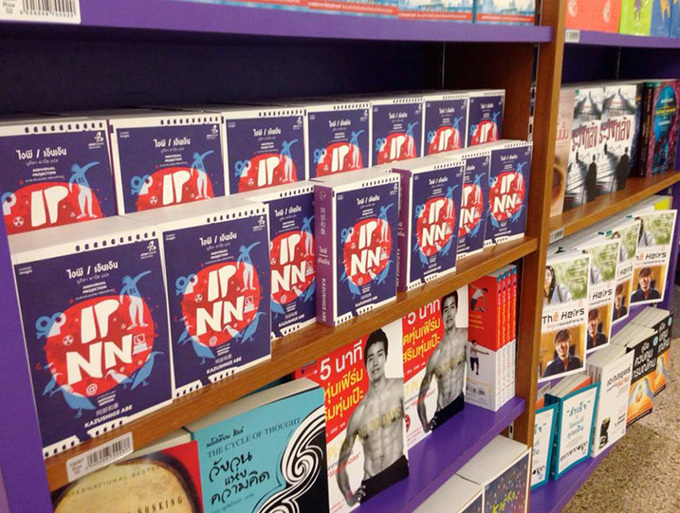
Kazushige Abe's novel in Thai language in a bookshop in Thailand.
The Thai edition of IP (Individual Projection)/NN (Nipponia Nippon)
――-This is your first visit to Thailand. How do you find it?
Abe: I was attracted to Bangkok in 20 or 30 minutes after arriving. I have only experienced the surface, but this atmosphere really suits me. It is nice to feel that I do not know where I am, and have a sort of non-directional and timeless sense.
――When you say you do not know where you are, do you mean that you do not know the location where you are standing? Or do you feel lost as you are surrounded by too many things?
Abe: In other words, I had certain images for this city, or images that it must be in such a region and country, before traveling to the country then when I actually arrived here I felt that I was in the city in the country that was not so different from what I had imaged before.
As for Bangkok I get the feeling that I cannot pinpoint "that Bangkok," - the feeling that I cannot identify how my image of the city and where the core is. I think the biggest reason for that is I have not yet walked around the city by myself. The image I had of the city up to now is inaccurate on a number of fronts, and it is like I cannot grasp all of it. I think that it will take a lot of time if trying to understand the whole picture.
――And here in Bangkok, two of your works, somewhat old works from your perspective, were translated. Did you wonder why these books were translated now, when you have more recent works, such as Shinsemia (Sinsemilla)?
Abe: No, in fact conversely, I felt very grateful. When proceeding with translation projects of my books not just in Thailand but in different countries we always say that translating Shinsemia first is setting a bar too high. It is a complicated novel and also quite difficult to read. The fact is, Shinsemia is sort of viewed as my representative work at the moment, but if readers were suddenly introduced to my work with that novel, there is a risk that it would end up slamming the gate shut.
Personally, I think the best way to understand me as a writer is to read my books in sequence, from my early works to begin with, so I am glad that my early works were translated first. I also hope people will read as many my books as possible.
――Would you like to see a lot of your books translated?
Abe: That is what I want most as you might expect. I have had little chance to have my books translated up to now, so in that respect, I have been "starved" of it. At long last, I have recently had opportunities to have my works translated one after another, so I feel now as if I might have finally obtained international approval.
――I think many of the readers of Writer in which this interview will be published probably want to become writers, so I would like to ask you a little about the process of writing IP and NN. When you write a book, do you always begin writing after creating the plot quite substantially?
Abe: I do that with most of my books, and sometime I create even 80-90 percent of the plot before starting to write. I create a plot after making an overall plan for the story. Long novels in particular become difficult to control if I do not do that initially, so...
――To turn to a somewhat more specific topic, IP features a spy training school and NN features a youth who does not know what to do with Japanese crested ibis. Was this inspired by something? Why did you choose a spy training school and crested ibis?
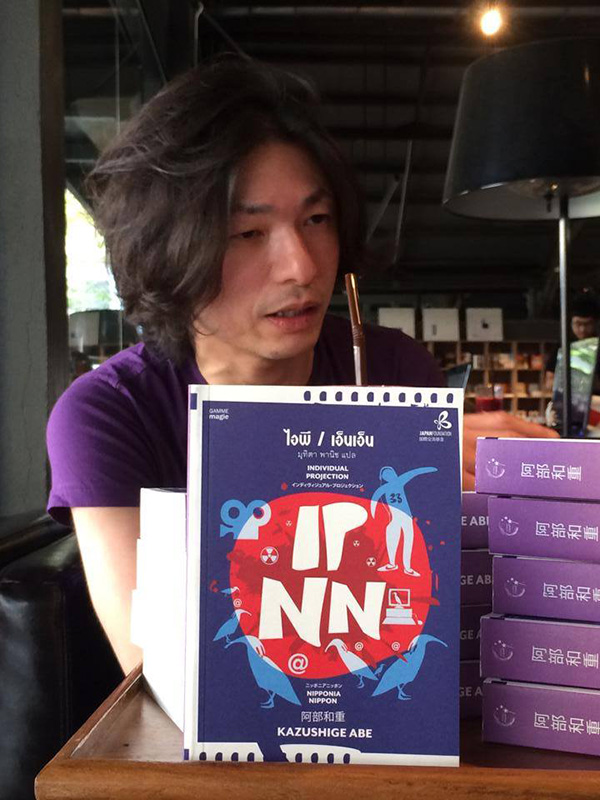 Abe: It can be said that I have been attempting the same thing since Amerika no Yoru. There is a sort of stereotype which is thought to be a common thing in society. I think that it exists as a word or phrase. Given that literature is a medium that deals with words, my perspective of literature, or rather of the purpose of literature, is that it instigates a shift in these shades of meaning that are circulating in society, the images associated with concepts and proper nouns like that. In my view, literature has been functioning as a device in that way.
Abe: It can be said that I have been attempting the same thing since Amerika no Yoru. There is a sort of stereotype which is thought to be a common thing in society. I think that it exists as a word or phrase. Given that literature is a medium that deals with words, my perspective of literature, or rather of the purpose of literature, is that it instigates a shift in these shades of meaning that are circulating in society, the images associated with concepts and proper nouns like that. In my view, literature has been functioning as a device in that way.
In 1994, when Amerika no Yoru was published, the image associated with Bruce Lee was that of a movie star. Alternatively, he was strongly associated with the martial arts, and his philosophical side was not getting much attention. So I tried to bring together a type of Bruce Lee philosophy and the context of the so-called new academism of French contemporary thought of the 1980s around at that time by using literary criticism. I think that I was trying to regenerate Bruce Lee into a different symbol although I was doing that without a clear vision at that time.
In IP I brought in Julio Iglesias, the international singer of so-called "moody pop music." I was changing that Julio Iglesias, and making him into a symbol of another, separate Julio Iglesias.
I thought that if I took a spy and questioned the ontological meaning of what a spy is, it would be possible to come up with an interesting story and discuss the issue of identity from that.
Spies are a catchy topic, aren't they? In part because of confusion over where I was coming from myself, from the outset with America no Yoru I had also arbitrarily assumed that suddenly employing the name "Bruce Lee" in pure literature would be a way of presenting my own distinct personality. At that time, in the 1990s, the capacity of literary magazines did not feel very broad. I thought that by presenting spies, a symbol that might appear in an entertaining movie, it might also be possible to change the image of Japanese pure literature.
So with IP, I thought I could bring the image of pure literature closer to the street by inserting Julio Iglesias, spies and the Shibuya sex industry into the story, and that by doing so, I would be able to accentuate my own position, if you like, in Japanese literary history. At any rate, I was young at the time and felt an extreme sense of urgency that if the genre was left as it was it would come to an end, and so it had to be changed.
At that time most literary magazines that handled pure literature were conservative. IP is a very long title and it is in katakana - so the title alone was debated a lot. Some members of the editorial team were concerned about going with that title. The person in charge of my work at the time stood up for me, and I got the go-ahead to use it. There were a lot of things like this that had to be changed.
20 years have passed so I can say this now, but I am proud that I played a part in changing the image of Japanese pure literature. IP was the catalyst for that.
――So, you consider yourself to be a writer of pure literature?
Abe: Yes, I do, although I was someone who was outside of so-called orthodox literary history education, and so entered that world as an outsider. Gunzo, the publication I chose to submit my work to, was in itself a place of orthodox literature, in a way. A number of big names made their debuts there, beginning with Haruki Murakami and Ryu Murakami. Kojin Karatani and Meisei Goto are two others.
In fact, the writers I just mentioned were individuals outside the orthodox image of pure literature at the time, but when you look back now you can also say that they were constructing new notions of "orthodox." Given that I intentionally gained entry to that, you could say that first and foremost, I am writing novels in the pure literature genre.
At the same time, if you were to ask what pure literature is, I think it is difficult to define it affirmatively by saying "it is this," although it may be possible to define it by negation. My departure point was that originally, when it came to the literary genre, it was a case of anything goes. The reason I was able to write America no Yoru is because of the ancestral base provided by the modern novel Don Quixote. Reading it had a profound effect on me. I realized that if anything and everything was already being tried in those days, then I was free to do experiment as I liked.
That was my departure point, and I think this also ties in to the image of Bangkok, but literature is something that possesses directionlessness and timelessness, I believe. Conversely, with genre novels the conventions are much more rigid, and so that is the point of divergence. Literature, pure literature, so to speak, subsumes everything. That is how I perceive it.
――In NN, why exactly did you decide to try to write about the Japanese crested ibis in the first place?
Abe: By chance I was at home watching the news, and there was a story on about Japanese crested ibis. I think the story was about a pair of crested ibises that Japan had received from China. I was watching it and it occurred to me that crested ibis could be used, as it is, as a metaphor for the Emperor. And that gave me the idea that a novel about going to kill a crested ibis would be possible.
I somehow belong to the Japanese literature genre. I too thought about various things when I was in my 20s, such as how things could be written in Japanese literature, and what the "Japan" in Japanese literature means. It is possible to interpret it as domestic Japan, and it is also possible to interpret it as how Japan is viewed when looked at through foreigners' eyes. At times like that I would wonder what aspect of Japan I could write about. In that respect, there was a connection.
In other words, what I have been doing since America no Yoru is stories about young people and youths who try to be exceptional in some way, but end up failing. That being the case, in the context of Japan if we talk about "someone exceptional" the first name on the list is the Emperor. I have been writing about this idea of "someone exceptional" all along. The human potential of spies that I pursued in IP also ends up at a kind of exceptional-ness.
So the fact is that this orientation of mine and the Japan that I thought of when I thought about trying to write a piece of Japanese literature came together in NN. I had the news story about the crested ibis in mind, and tried to assemble it into a format that was more defined and easy to understand.
NN was released in 2001 but I wrote it in 2000. I began using the Internet from 1997, but it was mostly from around 2000 that IT-related infrastructure took shape. The Internet made life much more convenient and it was full of various features, including Google searches and word-processing software for PCs.
I took advantage of this to assemble my own style of writing while writing NN. With that novel, to begin with I devoted myself to doing Internet searches in order to study and gather together all the information I could on the Japanese crested ibis. I joined that information together, and assembled the novel like I was weaving fabric by combining references with references. All along, since America no Yoru, I had been making full use of references but once I became able to use the Internet I became able to assemble them more tightly.
That is the major difference between IP and NN. IP also contains various references, but that was done manually. I had books and reference materials sitting next to me and I transcribed references from them. I also made intensive use of dictionaries when selecting vocabulary, and joined together a range of terminology and kanji, although that is something that ends up being lost once the works are translated.
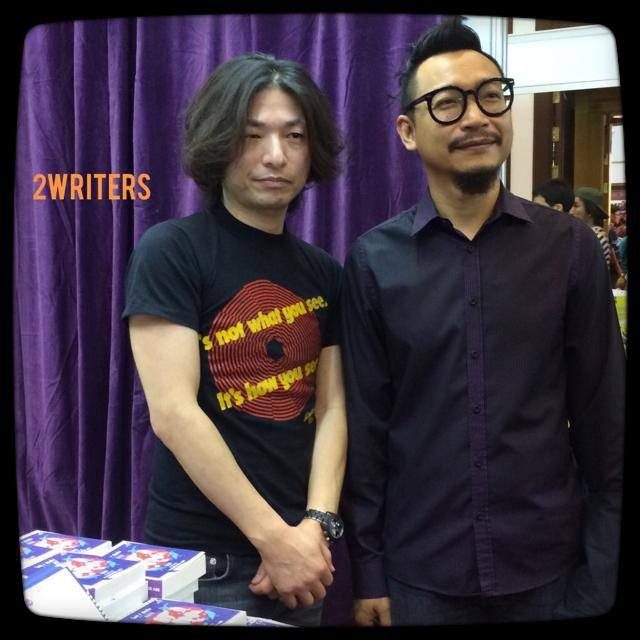
With Thai writer Uthit Hemamoon
On being an Asian writer, and the value of literature
――I would like to ask a few questions about "Asia," just in terms of your own feelings. That you are here like this now, in Bangkok, is clearly because you belong to the category of "Asian writer," I think. However, when you are referred to as "an Asian writer" like this, do you recoil from it in some way, or do you conversely accept it straightforwardly?
Abe: I am not particularly opposed to it. Perhaps it is because I only have a sparse image of "Asia." When it comes to "Japan" then I have more of an actual sense of it; it is more defined.
The fact is that the things I obtain sensations from are information and symbols. The symbols of Japan-ness are all in place, and so from them I have a sense that I am a Japanese writer. And consequently when I asked myself how, as a Japanese writer, I now go about writing Japanese literature, the outcome was NN.
As soon as the frame of reference becomes "Asia" the thing becomes vast. With regard to Asia as knowledge and as information, so to speak, while it is possible for me to talk about it and conjure up an image of it, in terms of what I perceive if I link myself with that "Asia" - to "Asia" as a symbol - and what I can talk about in my own right, now that you ask me that question, I find it very difficult.
I do not think this is something limited to me. Many people's entry point is a country, or a region, or a culture or a people, as opposed to a region as a block.
When we talk of Asia, East Asia and West Asia are completely different, for example. Then there is South Asia and the Far East as well. Currently there are said to be various confrontational structures present in East Asia, in fact. China, South Korea and Japan are in conflict, for example. Even if there appear to be attempts to reconcile at a political level, at the level of mainstream citizens, you can detect considerable antagonism. Knowing that, when you come to consider exactly which vantage point to talk from, it is difficult.
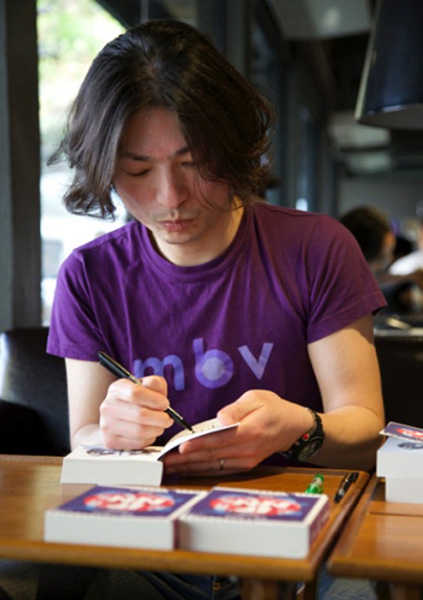 In concrete terms, I was invited to Bangkok and now I am here. What sort of actual feelings am I able to talk about in regards to that now? What I felt for starters is that Tokyo is very much a backwater. It has been less than a day since I arrived but since yesterday I have seen demonstrators, the faces of various people walking the streets, and the cityscape. At any rate, Japan today, not just Tokyo but Japan overall, is becoming more insular and myopic, although to an extent this is also an image issue I think. People are also saying of course that Japan appears to be swinging to the right. There is a strong impression that a "self-poisoning" is taking place, in the form of being inward-looking. I think everyone knows that it is unacceptable to leave this as it is, but there is no means of addressing it, so the situation is troubling.
In concrete terms, I was invited to Bangkok and now I am here. What sort of actual feelings am I able to talk about in regards to that now? What I felt for starters is that Tokyo is very much a backwater. It has been less than a day since I arrived but since yesterday I have seen demonstrators, the faces of various people walking the streets, and the cityscape. At any rate, Japan today, not just Tokyo but Japan overall, is becoming more insular and myopic, although to an extent this is also an image issue I think. People are also saying of course that Japan appears to be swinging to the right. There is a strong impression that a "self-poisoning" is taking place, in the form of being inward-looking. I think everyone knows that it is unacceptable to leave this as it is, but there is no means of addressing it, so the situation is troubling.
Various cultures are entering Japan. It is possible to eat the cuisines of a range of countries, for example, and people say Japan has anything you can think of. However, when you are in Japan you cannot come into contact with the multitude of races that you can in Bangkok. In Japan, you generally only meet Japanese people. Naturally that is not the case if you go to Roppongi, but that is a situation where foreigners converge in one location. Whether this is good or bad has to be considered separately, but coming to Bangkok I get the feeling this is probably an extremely natural and desirable shape for an international city.
Looked at in comparison to that, I had a genuine sense that Japan and Tokyo are merely backwaters, realistically speaking. It occurred to me that this has to be considered and accepted as one reality.
――You said you had a sense of being a Japanese writer. In Thailand at present the political situation is unstable and writers are holding seminars and other events themselves. In Thailand there are not many so-called anti-establishment intellectuals, and essentially writers perform the role of public intellectuals, to a large extent. The standpoints that respective writers take vary, but at the same time they are debating what they themselves should be doing now.
With that in mind I would like to return to talking about Japan. Three years have passed since the earthquake disaster. You have participated in genron cafe events and spoken to Hiroki Azuma. Do you think that as a writer you should do something special, or be considering the role of "intellectuals," for want of a better word?
Abe: That is a very important question. In that earthquake disaster, in the midst of catastrophic circumstances on that scale, probably the first thought that occurred to people was what they could do personally for society at such a time, I believe.
That being the case, I think among people in the literature field, the person who thought the most about what they could do in that earthquake disaster situation was Hiroki Azuma.
By that I mean, with literature there is nothing to do. It was that catastrophic situation that made us realize there is nothing we can do. The so-called arts and sciences debate went on for the last dozen or so years, possibly since the digital revolution. My perception is that the point at which that debate became most prominent was the March 11 earthquake, with the realization that the arts are not really very useful.
At the same time, however, this also triggered a reevaluation, once again, of what literature can do within this society. In the course of that, Hiroki Azuma for example is boldly pressing ahead with a plan to transform the Fukushima Daiichi nuclear power station into a tourism spot, as one way of preventing the problem from fading from memory. He also traveled to Chernobyl to collect information.
Thinking in the same terms, if you consider what it is that literature as a genre deals with, then as you would expect the answer is words. Exactly one year after the disaster, I wrote in an essay in the Asahi Shimbun newspaper that trust in words had eroded to a great extent. Due to various problems, such as the government and administration's response to the nuclear power problem and information cover-ups by power companies, everyone had grown suspicious. This earthquake disaster ended up becoming a trigger: it made people who were already suspicious of information, amid computerization and the Internet environment, even more suspicious. I wrote about the necessity, in light of that, to once again restore the value of words.
In that context, as I also discussed earlier, one of the purposes of literature as a device, so to speak, is to bring about a shift in how we perceive the stereotypes that permeate society so readily. I realized that this ceaseless task is probably one thing that literature can achieve.
The word "bonds" was talked about a lot. The fact that "bonds" was used as a sort of rhetorical flourish demonstrated that words themselves reverberate and are extremely beautiful, and that they had of course proved useful in some way, I believe. But at the same time, quite possibly there are also people who feel extremely pressured by the word "bonds," since the fact is there are of course people who are unable to forge bonds.
As you might expect, literature must stand on the side of the minority and shift perceptions of the word "bonds." That is the conclusion I came to.
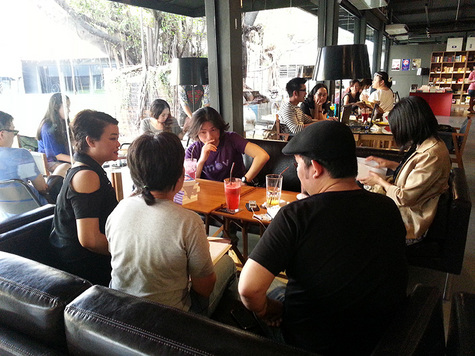
Editors from Gamme Magie Editions, which published the Thai edition of IP / NN.
Interviewer: Sho Fukutomi (Thai literature researcher)
Excerpted from an interview in issue 25 of Writer, Thai literary magazine, June 2014
Kazushige Abe
Kazushige Abe was born in 1968. He graduated from the Japan Institute of the Moving Image). His debut novel, Amerika no Yoru (American Night), won the 37th Gunzo Prize for New Writers. Subsequently, Mujo no Sekai (Heartless World) won the 21st Noma Literary Prize for New Writers, and in 2004, Shinsemia (Sinsemilla) won both the Ito Sei Prize and the Mainichi Publishing Culture Award. In the same year, he also won the 132nd Akutagawa Prize for Gurando Finare (Grand Finale). In 2010, Pisutoruzu (Pistols) won the 46th Tanizaki Jun'ichiro Prize. Recent works include Kuesa to 13-banme no Hashira (Quasar and the 13th Pillar) and Shikaku (Square).
Keywords
- Literature
- Philosophy/Religion
- Japan
- Thailand
- Bangkok
- Bruce Lee
- French contemporary thought
- Julio Iglesias
- Shibuya
- Gunzo
- Pure Literature
- Murakami Haruki
- Ryu Murakami
- Kojin Karatani
- Meisei Goto
- Don Quixote
- Emperor
- Tokyo
- genron cafe
- Hiroki Azuma
- Fukushima Daiichi nuclear power station
- Chernobyl
- Asahi Shinbun
Back Issues
- 2025.7.31 HERALBONY's Bold Mis…
- 2024.10.25 From Study Abroad in…
- 2024.5. 2 People-to-People Exc…
- 2022.11. 1 Inner Diversity<3> <…
- 2022.9. 5 Report on the India-…
- 2022.6.24 The 48th Japan Found…
- 2022.6. 7 Beyond Disasters - …
- 2021.3.10 Crossing Borders, En…
- 2020.7.17 A Millennium of Japa…
- 2020.3.23 A Historian Interpre…

